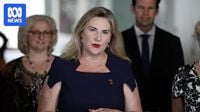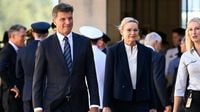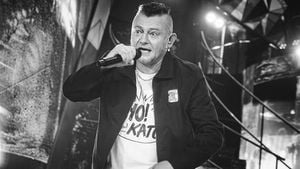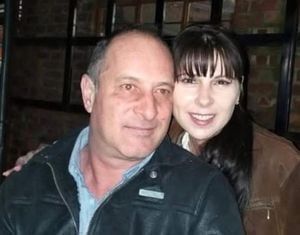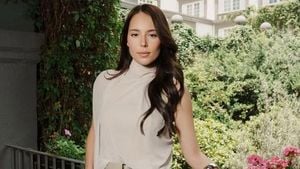In a significant political shift, the Australian Liberal Party is grappling with its worst electoral defeat in nearly 80 years, following the recent landslide victory of the Labor Party led by Prime Minister Anthony Albanese. The election, held on May 3, 2025, saw the Coalition secure only 39 seats in the lower house, prompting urgent discussions about the party's future direction and leadership.
US President Donald Trump weighed in on the situation for the first time, expressing his support for Albanese, stating, "Albanese, I’m very friendly with," during an interview with the Sydney Morning Herald. However, Trump was less flattering towards former Opposition Leader Peter Dutton, admitting he had "no idea" who he was. This comment has raised eyebrows within the Liberal Party, as it underscores the challenges Dutton faced during his leadership.
Former Liberal MP Jason Falinski has suggested that Tim Wilson, the Goldstein candidate, should be considered for the party leadership if he manages to win his ultra-marginal Melbourne seat, where he currently trails independent MP Zoe Daniel by just 95 votes. Falinski believes Wilson could help the party reconnect with inner-city voters, a demographic that has increasingly distanced itself from the Coalition.
Meanwhile, Westpac CEO Anthony Miller described Labor's clear majority as a "really significant positive" for Australia amidst global uncertainty. He emphasized that the continuity and certainty provided by the Labor government will be beneficial for the country's economic stability, especially in light of Westpac's recent announcement of a first-half profit of $3.45 billion.
Outgoing Liberal Senator Hollie Hughes has not held back in her criticism of the party's leadership, particularly targeting Angus Taylor, the shadow treasurer. Hughes stated that the party's poor performance in the election was largely due to a "complete lack of policy" and that candidates had "nothing to sell" to voters. "We had no tax plan, we had no economic narrative," she lamented during an interview with Sky News Australia.
Hughes expressed her concerns about Taylor's capabilities and suggested that many of her colleagues share her views. She asserted that the absence of a coherent economic strategy left the party unable to effectively communicate with the electorate. "There was just no policy for anyone to sell, and that just became increasingly prevalent throughout the campaign," she said.
As the party contemplates its next steps, Deputy Leader Sussan Ley has indicated that a leadership ballot will be held after the final votes are counted. Ley acknowledged the need for the party to reflect on the election results with humility and to consider the future direction carefully. The leadership contenders currently include Taylor, Ley, Shadow Immigration Minister Dan Tehan, and Shadow Defence Minister Andrew Hastie, though none have formally declared their candidacy yet.
Despite the tumultuous atmosphere within the party, Deputy Prime Minister Richard Marles has downplayed concerns regarding the lack of a congratulatory message from Trump, emphasizing that the relationship with the United States remains strong. Marles stated, "The relationship with the United States is profoundly important," and expressed confidence in managing the relationship with the former president.
In a further twist, the future of Senators Jacqui Lambie and Adam Bandt hangs in the balance as counting continues. Lambie faces stiff competition from One Nation's Lee Hanson, while Bandt is in a tight race for his seat against Labor candidate Sarah Witty. The outcomes of these races could significantly impact the dynamics within the Senate.
On a different note, Nationals MP Barnaby Joyce has provided an update on his health after being diagnosed with prostate cancer. "I feel fine," he told Sunrise on May 5, 2025, adding that he had known about his diagnosis throughout the election campaign but chose to keep it private to avoid distraction.
The Coalition faces a critical juncture, with calls for a "fundamental reorganisation" of the party's structure to remain relevant to voters. Polling suggests that the Coalition could face its lowest representation in parliament since its formation. Hughes has been vocal about the need for reflection within the party, stating that certain individuals need to reconsider their roles in the recent electoral defeat.
As the Liberal Party prepares for a leadership transition, the focus will be on how it can regain the trust of voters and re-establish its relevance in urban areas, which have increasingly leaned towards Labor. The next leadership decision will be crucial in determining the party's trajectory in the coming years.
With the election results still being finalized, the Liberal Party's path forward remains uncertain. However, the urgency for change is palpable as party members navigate the aftermath of a historic defeat.
